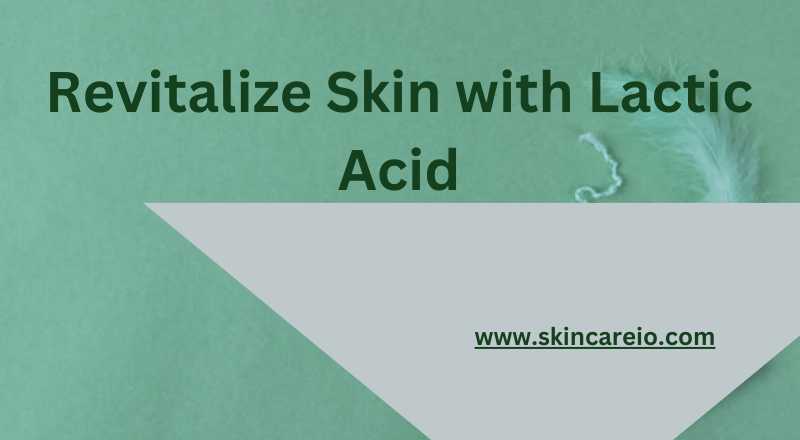Lactic acid is an alpha hydroxy acid (AHA) derived from milk and is a popular ingredient in skincare products due to its numerous benefits for the skin. Its mild exfoliating properties make it a versatile addition to skincare routines, suitable for various skin types and concerns.
One of the primary benefits of lactic acid is its ability to gently exfoliate the skin’s surface, effectively removing dead skin cells and promoting a smoother complexion. This exfoliation not only enhances skin texture but can also help address a range of skin issues.

Lactic acid offers several benefits to the skin:
Various forms of Lactic acid to skin:
Lactic acid is used in various forms in skincare products to address different skin concerns to various skin types: It includes Cleansers, Toners, Serums, Masks, Moisturizers, Lotions and Creams, Peels and Spot treatments etc Lactic Acid are gentle cleansers that contain lactic acid as one of the main ingredients.

They provide a mild exfoliation while cleansing the skin, leaving it refreshed and ready for other skincare products. Lactic acid toners are applied after cleansing to balance the skin’s pH and provide gentle exfoliation. They can help remove residual makeup and impurities while preparing the skin for serums and moisturizers.
Read Also: Uncovering the Hidden Powers of Vitamin C
Lactic acid serums contain higher concentrations of lactic acid and are designed to be applied directly to the skin. They provide more targeted exfoliation and are often used to address specific concerns like hyperpigmentation or fine lines.
Lactic acid masks are formulated with lactic acid and are typically used as a weekly or bi-weekly treatment. They offer a more intensive exfoliation and can help rejuvenate the skin’s appearance.
Benefits of lactic acid to skin
Exfoliation
Acne
Treatment
Hyperpigmentation
Brightening
Improves Skin
Barrier
Moisturization
Reduced Appearance of Fine Lines
Lactic acid moisturizers containing lactic acid provide both hydration and mild exfoliation. They are suitable for those with dry or dehydrated skin who want to incorporate lactic acid into their daily routine. Lactic acid isn’t limited to facial skincare. It’s also used in body lotions and creams to exfoliate and moisturize the skin, making it smoother and more radiant.
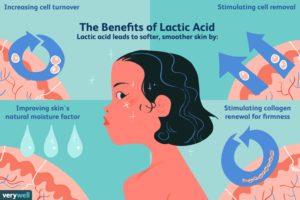
Lactic acid peels are stronger treatments typically performed by dermatologists or licensed skincare professionals. These peels offer more significant exfoliation and can address various skin concerns, including acne, pigmentation, and texture issues.
Some skincare products contain lactic acid as a spot treatment for blemishes or hyperpigmentation. These are applied directly to the problem areas for targeted treatment. Pre-soaked pads or wipes containing lactic acid provide a convenient way to apply the acid evenly to the skin. They are often used for quick exfoliation on the go.
Advantages:
One of the most notable advantages of lactic acid is its capacity to improve moisture retention in the skin. Unlike some other AHAs, lactic acid acts as a humectant, attracting and holding onto moisture. This makes it an excellent choice for individuals with dry or dehydrated skin, as it helps to enhance the skin’s natural hydration barrier.
The result is skin that feels softer, plumper, and more supple. Lactic acid can also be a valuable to fight against hyperpigmentation. It works by encouraging the shedding of pigmented skin cells and promoting the growth of new, less pigmented ones. This process can help fade dark spots, age spots, and sunspots, leading to a more even skin tone over time.
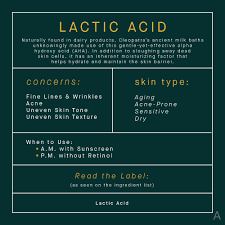
In addition to its exfoliating and moisturizing properties, lactic acid is known for its ability to address certain types of acne. It effectively unclogs pores, reducing the formation of blackheads and whiteheads, and can help prevent break outs. Moreover, its gentle nature makes it a suitable choice for individuals with sensitive skin who may not tolerate stronger exfoliants.
Furthermore, regular use of lactic acid can lead to a brighter complexion. By removing dull, dead skin cells and promoting the turnover of fresher, more radiant skin, lactic acid contributes to a youthful and healthy appearance. Its collagen-stimulating properties also play a role in reducing the appearance of fine lines and wrinkles over time. It’s important to note that while lactic acid offers these compelling benefits, it does increase skin sensitivity to the sun.
Therefore, sunscreen should be a non-negotiable part of your skincare routine when using products containing lactic acid. Moreover, starting with lower concentrations and gradually increasing usage can help minimize the risk of irritation, especially for those with sensitive skin.
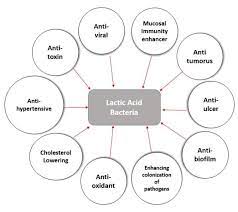
Consulting with a dermatologist is advisable if you have specific skin concerns or conditions, as they can provide personalized guidance on incorporating lactic acid into your skincare regimen for the best results.
Read Also: Salicylic Solutions for Radiance
Precautions to be taken:
Before using skincare products containing lactic acid, it’s essential to take certain precautions to ensure the best results and minimize the risk of irritation. Firstly, perform a patch test by applying a small amount of the product to a discreet area of skin to check for any adverse reactions like redness, itching, or burning.
Read Also: Embracing Glutathione for a Youthful Glow
Always follow the product’s instructions regarding usage frequency and duration. If you’re new to lactic acid or have sensitive skin, start with lower concentrations and gradually increase as your skin becomes accustomed. Be diligent about applying broad-spectrum sunscreen daily, as lactic acid can increase skin sensitivity to the sun.
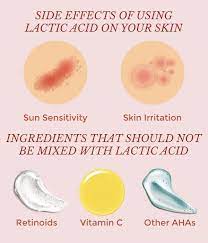
If you have specific skin concerns or conditions, consider consulting a dermatologist for personalized advice on incorporating lactic acid into your skincare routine. Lastly, avoid using lactic acid products in conjunction with other potent exfoliants to prevent overexfoliation and potential skin damage.
In conclusion, lactic acid is a versatile and effective skincare ingredient with a wide range of benefits. Its gentle exfoliation, moisturizing capabilities, and ability to address concerns such as hyperpigmentation and acne make it a valuable addition to skincare routines. When used responsibly and in conjunction with sun protection, lactic acid can help you achieve smoother, more radiant, and healthier-looking skin.
